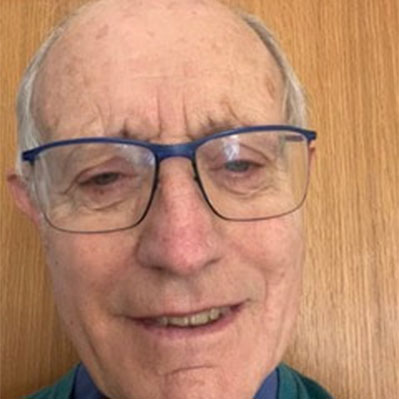“You live thinking your life is ahead of you. When I was on my third treatment, I realized that probably I didn’t have my life ahead of me.”
What was going on in your life when you were diagnosed with Hodgkin lymphoma?
It was 1979, and I was 36. I felt I was young, but I was always told I was quite old to have symptoms of Hodgkin’s. The doctors seemed a bit surprised. I found some lumps in my neck and went to my GP—general practitioner. He sent me to an ear, nose and throat specialist, and when she took a biopsy, she reported to me that it was Hodgkin’s. I had little idea what that was, so I went to a local library and looked it up. I was referred to the cancer unit at the Radcliffe Hospital in Oxford, England, where I was put on a course of radiotherapy. I drove there first thing in the morning, but I carried on working.
What happened when your treatment was over?
They didn’t use the word “cured,” but they said the diseased tissue was gone. There was never a guarantee that it wouldn’t come back. I’m not sure how effective I was at work, but it kept me occupied, and my colleagues were very supportive. Three years later, more lumps appeared, I received another course of radiotherapy, and I continued working. I was told it was radical treatment and was supposed to clear it up completely. But three years later, more lumps appeared.
How did you get through that?
Although it wasn’t easy, I did survive. I was married with four children. My wife was a pediatric physiotherapist, but I was the breadwinner. When lumps in the neck appeared again, I went back to the same treatment center, where a new oncologist insisted on another biopsy so he could understand the nature of my cancer. He wanted to try chemotherapy; I couldn’t have any more radiotherapy. He certainly gave me the right treatment, although it was a bit rough. I didn’t feel well—no energy.
I continued to work and had quite a good career. I’m a professional engineer and at the time was working on the early development of the CT scanner. I later worked on the MRI scanner, as well as other diagnostic medical equipment before moving on to communications equipment. But I retired early, because in that line of business—as an engineer—you need a lively mind. I was lucky to be there.
Have you had late effects as a result of your treatment?
I’m very weak in the shoulders and upper body, from my chest to my chin. I go to a gym near where we live in Stamford. The owner is an ex-boxer; we don’t box each other, but some of the exercises, where you punch a bag, are very useful in strengthening the shoulders and arms. Then, I was at a health check when the doctor felt I had a heart murmur. So I had an artificial valve inserted. Also, my voice is strange—a bit squeaky. I used to sing in a barbershop group, a style of singing that began in the U.S. There were 12 or 14 people in our group, and I sang bass. I can’t sing at all now, which is rather sad.
The worst thing is my balance; it’s getting worse. When I go walking, I use a stick—not so much for support, but to provide me with a bit of reference. I’m not sure how much of this is old age. I have a walking trolley with handles, which allows me to walk in a crowd without wavering. I also have an electric scooter, which I use if I’m going quite a long way.
Finally, my neck is quite small for a person my size. I’m about six feet tall. So when I buy a shirt that fits my body, it is too big at the neck for a tie.
You have a large extended family, including ten grandchildren.
Yes. We moved from London to Stamford because of my daughter; she’s a doctor who’s married to a doctor. Of course, they can’t treat friends or family. I have a loving, supportive wife; we’ve been married 50 years now. I consider myself very lucky.
Do you have advice for someone who might be facing Hodgkin’s or late effects?
Keep smiling. By the time I was on chemotherapy—my third treatment—I had begun to kind of live for the moment. Before I had these life-changing problems, I expected to live to old age. Both my parents did.
In other words, you live thinking your life is ahead of you. When I was on my third treatment, I realized that probably I didn’t have my life ahead of me. The fact is, I survived: the average age for death of a male in the UK is 79, and I’m 79.
